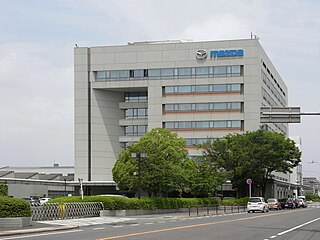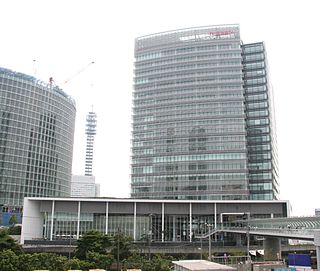
Biotechnia Ellinikon Trikyklon, or BET, was a small vehicle manufacturer founded in Athens by Petros Konstantinou. It was one of several manufacturers - the first appearing in the early 1940s - that converted BMW or other motorcycles into light utility three-wheelers. In 1965 it entirely designed and built a small five-seat passenger car with a BMW 125cc motorcycle engine. Although the type was certified, only one was built due to problems in availability of parts for further production. Following this design, three-wheeled truck models were developed and produced. A second passenger car model was designed and introduced in 1973, known as model 500, with a Fiat 500cc engine. With metal body, seating up to five passengers and featuring very good road handling, it was a rather advanced three-wheeler for its time. It was certified for production and 15 were built, of which one survives to this date in excellent condition. There were even talks with a South African company involving plans for exports or even transfer of production to that country, but they were never realized. The company ceased production in 1975.

MEBEA was an important Greek vehicle manufacturer, producer of light trucks, passenger automobiles, motorcycles, motorbike engines, agricultural machinery and bicycles.
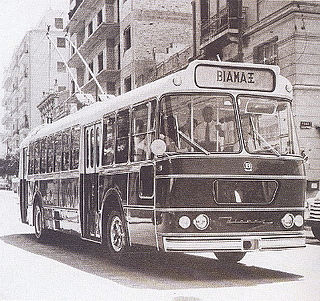
BIAMAX(Proper Greek pronunciation Viamax) was a Greek vehicle manufacturer. In the late 70's it was one of the biggest Greek companies, operating three factories and several other auxiliary facilities throughout the country. In addition, BIAMAX became a leading industry in Greece, in areas including Quality Assurance, technical training, process documentation and Research & Development. Although its main activity was vehicle manufacture, some of its subsidiaries were also involved in areas like tourist services, exports of farm products and shipping.

Petropoulos is today a major importer and distributor of vehicles and heavy machinery, having been, at the same time, one of the "historic" Greek engine and vehicle manufacturers.
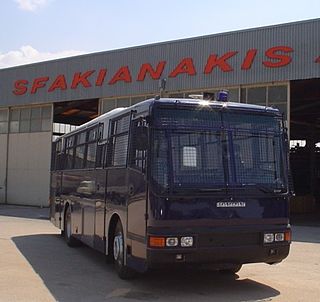
The Sfakianakis group of companies is a Greek conglomerate with a wide range of activities, employing over 2800 in 6 countries in 2014.

Saracakis Brothers group of companies is a major Greek Commercial and Industrial group, for two decades a traditional competitor to Biamax. Two of the most talented Greek vehicle engineers who had worked for Biamax, A. Rizos and I. Dracoulis also worked for Saracakis, Dracoulis having designed the company's characteristic, recognizable 'Σ' logo.

STYL KAR was named after its founder, the engineer Stylianos Karakatsanis. Its entire history is representative of a large number of Greek companies who were engaged in the construction of simple utility vehicles.

Alta was a Greek manufacturer of light and heavier three-wheeler trucks, motorcycles and passenger cars. Production of motorcycles and three-wheeler trucks with Sachs 50cc engines started in its first factory in Athens in 1962. The 50S motorcycle model was known for its reliability. In 1967 it designed and developed model A700, a heavier three-wheel truck with 2-cylinder BMW 35 hp engine and a payload of 800 kg. The truck, featuring a pleasant design and high reliability became one of the most successful vehicles of its kind in Greece. In 1968 Alta introduced a three-wheel passenger car, model A200. Powered by a Heinkel 200cc engine, the car was based on the German Fuldamobil, but with Alta's own body design. The company moved production to a new, larger factory in Elefsis where it operated until 1978.

DIM Motor Company, a Greek automobile maker, was created by Georgios Dimitriadis as a successor to his earlier company, Bioplastic S.A., which had produced the Attica automobile. The DIM represented one more effort by Mr. Dimitriadis to design and develop a modern car entirely by his company's own means. A 400cc, air-cooled, 2-cylinder, 30-hp engine was also developed in-house to power the vehicle, but due to delays in the engine development, the car was introduced with a 600cc engine and other mechanical parts of the Fiat 126 model. A 650cc Fiat engine was also used, in an improved version. The car was finally introduced at the Geneva Motor Show in 1977, and for this reason received more publicity than most Greek vehicles, appearing in many international publications. All development work had been made in a factory intended for its production in Acharnes, while the company was advertised in the Greek press; plans were also made for more versions, including a sports coupe. However, the costs involved and the car's poor prospects in the Greek market resulted in termination of production after only about ten had been produced. The whole project was abandoned in 1982, having been Georgios Dimitriadis' last venture in the automotive industry.

Malkotsis is the trade name for Technica S. Malkotsis A.E., which has historically been the most important Greek engine manufacturer, surpassing several engine manufacturers that flourished in Greece in the 1920s and (mostly) 1930s, like Dimadis-Kanakis in Volos, Peteinaris in Kalamata, Sideris, BIO, and others in Athens, etc. Located in Piraeus, before World War II Malkotsis produced various types of industrial machinery. After the war it produced industrial machinery for several Greek companies, but it progressively focused almost entirely on diesel engines, soon becoming the largest company in its field. Malkotsis engines found use in a variety of industrial applications, while its boat engine models became legendary for their reliability. A series of electric motors was produced as well. Its EM Diesel series included engines specifically designed for powering of vehicles and was employed in Malkotsis's own farm tractor models introduced in 1959. The tractors were produced for only a few years, due to lack of funding and other problems related to a complete lack of state support. The company faced financial problems later, due to competition from cheaper imports, and was acquired in 1991 by Drakos-Polemis A.E., a pump manufacturing company which used all Malkotsis infrastructure for its production purposes.
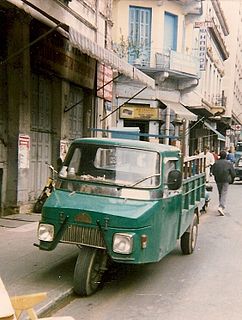
Ros was the trade name of vehicles produced by the Greek company 'Stavros Konstantinides O.E.', based in Athens. The Ros three-wheeler trucks were the most successful of its kind in Greece, having been produced by the thousands. Ros surpassed in sales even "Greek classics" like Alta and Styl Kar, and the characteristic shape of its trucks could be seen for several years in every corner of the country. And for good reason: The 'Rosaki' was one of the most robust and reliable vehicles ever used in Greece. In 2006, 30 years after the end of three-wheeler production, several Ros were still in use in excellent condition, more than any other three-wheeler type.
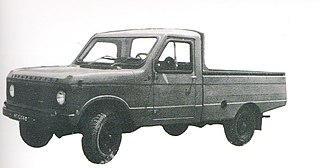
Balkania was the trade name of 'K. Zacharopoulos A.B.E.E.' a Greek industrial and trading company based in Athens that produced 4x4 jeep-type vehicles and 4x4 trucks. Since 1945, K. Zacharopoulos had been involved in vehicle repair and rebuilding. The Balkania company was founded in 1954 and since 1972 it imported Romanian and Indian vehicles. In 1975 it designed and introduced its own Autotractor model, a 4x4 multi-purpose truck with a Mercedes-Benz 3200 cc Diesel engine, metal cabin and a payload of 1,500 kg (3,307 lb). In 1979 the model was redesigned, with a modern synthetic cabin. It was produced, as some similar Greek vehicles, until a change of a favorable categorization for agricultural vehicles in 1984 limited its prospects. The vehicle was modestly successful, as it exhibited certain quality problems.
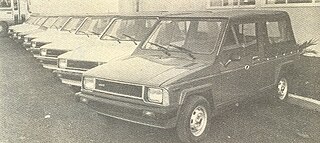
Automeccanica was a Greek automobile producing company. Founded in 1979, it was one of the companies that produced the "passenger-utility" type of vehicle popular in Greece at the time for tax categorization reasons. Its creators were former executives of Autokinitoviomihania Ellados a company founded in 1975 to also produce vehicles of this type – it assembled Italian Fissore models based on Fiat products, as well as other Fiat models and variants. Automeccanica followed a different path, building the Zebra model, a passenger-utility car based on the Daihatsu Charade, as well as assembling the Charade itself. In 1985, when the law favoring the Zebra-type vehicles changed, Automeccanica stopped its production and started licence production of the Soviet Lada Niva model, while it developed its own cabrio-version of the car. In 1988 it acquired its former "father" company, Autokinitoviomihania Ellados and the latter's factory in Thiva. Automeccanica went out of the car-construction business in 1995.

EBIAM was a Greek company based in Thessaloniki that, among others, produced 4x4 trucks. It belonged to a generation that benefited from a Greek law classifying any vehicle that could be used for agricultural purposes as "agricultural machinery".
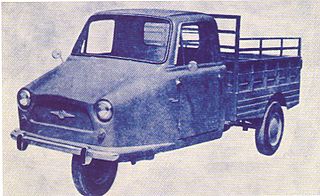
Motoemil was a Greek truck manufacturer based in Thessaloniki. It was named after Emilios Antoniades who started his business, together with his brother Konstantinos, by constructing crude-made trucks assembled from motorcycle and automobile parts. By the mid-1960s, like other similar Greek manufacturers, they were already developing and building complete "automobile" three-wheeler trucks. Motoemil was one of the first of its kind in Northern Greece and soon became the largest in that region, its products sold throughout the country. The first models used 1200cc Volkswagen air-cooled engines. A completely redesigned, more modern-looking model was introduced in 1970, using a German Ford engine.

Candia is a Greek company producing Agricultural machinery and equipment, based in Herakleion, Crete. It is representative of a large number of companies in this country, that produced multi-purpose light farm vehicles.

TEMAX is today the leading Greek manufacturer of fire-fighting vehicles, while under its previous name, Tangalakis, it has been one of the most historic bus manufacturers in that country.

Dinap was one of the smaller Greek machine and truck manufacturers with its factory on Liosion St., in Athens. The Dinap 1200 was a three-wheel truck produced in the second half of the 1960s. It was powered by a 1200cc, 34 hp (25 kW) air-cooled Volkswagen engine and could legally carry 1,000 kg (2,205 lb). This load was higher than the equivalent for most other three-wheel trucks, but this made little difference since those vehicles were frequently loaded with up to 3 tons.
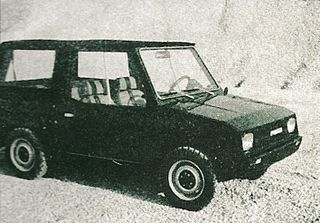
Autokinitoviomihania Ellados was founded in Athens in 1975 by a group of Greek businessmen, including the owners of the company importing Fiat in Greece.
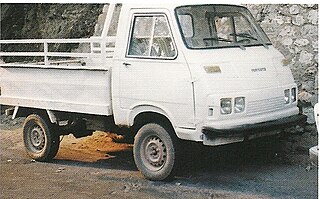
Record A.E.B.E. was the name of a Greek company producing agricultural machinery and vehicles, founded in Heraklion, Crete in 1957 and dissolved in 1999.



